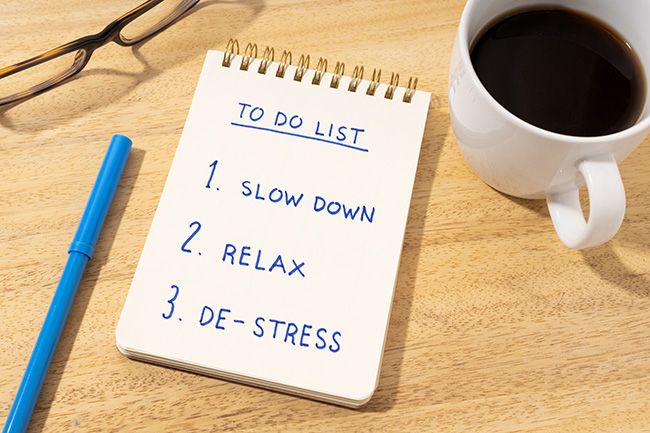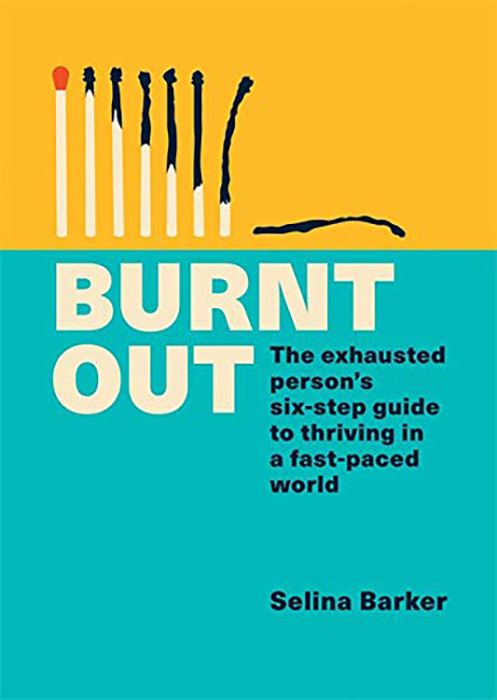As a mum, do you ever feel completely exhausted, like you might burn out if you keep going the way you are? Making time to relax in our busy days of work and kids can be a real challenge.
MORE: How to survive the school holidays with teenagers – by a psychologist
Newly published survey data by Kalms Rhodiola reveals that 63 per cent of parents are left feeling stressed, exhausted and overwhelmed, forcing them to seek help. The top causes of parental burnout are financial pressures, lack of control and poor work-life balance.
WATCH: Celebrities who like to meditiate
The survey also found that mothers are at a greater risk of burnout than their male counterparts.
Selina Barker, life design & career coach, and author of Burnt Out told HELLO!: "Burnout across the board is on the rise and the pandemic saw it rise higher than it ever has been before. Parents were at the leading edge of people experiencing burnout with homeschooling.
"Even before the pandemic though, parents in the modern day set up have so much on their plates. So many parents are burning out just trying to live their lives, do good work and look after their family."
MORE: Real life: Former couple who co-parent and still holiday as a family share their story
Selena speaks to us about parental burnout below…
What is burnout?
Selena says: "The World Health Organisation classified burnout is the result of prolonged stress in the workplace.
"My argument always is that being a parent is a job. It is work, extremely demanding work. It's incredibly fulfilling but we do need to recognise how much energy on the physical, mental, emotional and spiritual levels this particular job uses up.
"Often people don't realise they are going through burnout and the symptoms are really wide-ranging."
The symptoms of burnout
"Obviously you have the constant feeling of exhaustion – that's one of the most common symptoms.
"There's a difference between being tired and burnt out. When you're tired and had a lot on, you can reset yourself with an early night and a chilled-out weekend. But when you're burnt out it takes a lot more than that. Your whole system is exhausted.
"The other symptom people feel is the overwhelming feeling that they can't cope.
"Then there are other symptoms like mental burnout, where you get decision fatigue, you feel foggy, get anxiety and depression can also be a symptom.
"Emotional burnout is where you can feel irritable. You don't have the capacity any more; you feel like you don't care like you used to – and that can feel scary. Suddenly you want the people you care about the most to get off your back. People can often find themselves making silly accidents and forgetting things they'd normally remember.
"It's a combination of symptoms that separately you wouldn't associate with burnout."
MORE: 5 life-saving first aid tips for parents to know
The difference between a nervous breakdown and burnout
"A nervous breakdown is a severe burnout," explains Selena.
"When you're severely burnt out, it's been going on a long time and it's got really intense, that's when if you work you need to sign yourself off. If you're in a place feeling so unlike yourself and quite scared about your mental health, you need to get medical professional help. It can take months to recover from.
"With any degree of burnout, the top priority has to be your rest and recovery.
"A mild burnout is where you've pushed yourself too much then need to take a weekend off to recover and clear your diary for the next couple of weeks to live at a slower pace."
Is burnout a new phenomenon?
"Some of the pressures that women today are under are new, but our parents' generation also saw mothers running around nonstop trying to do everything and having too much on their plates.
"I think it was dealt with differently then. Women had breakdowns then; they'd let it get to a worse degree. People weren't as open about struggling and finding it tough.
"We talk about it more now. It's so important to discuss the early signs of burnout and the mini burnouts, because then we can catch it earlier on and prevent a nervous breakdown from happening.
"There's this idea that has been there for generations that mothering is about self-sacrifice, that our needs are no longer important. We have this deep in-built narrative around motherhood that it's selfish to think of your own needs – I hear this a lot in my workshops."
The four burnout archetypes
"The burnout archetypes are something I started to see after interviewing hundreds of people about their experiences of burnout.
"I started to notice that people behaved in different ways as they kicked into overdrive and got towards burnout. The ways people behaved reflected their personality and their strengths.
"You've got the Overdoer, the Overthinker, the Overgiver and the Overachiever. You can be one archetype, a couple or even all four."
The Overthinker
"This applies to people whose strength is to think, to piece things together and to problem solve, so when they're in overdrive they can't stop thinking. You have to figure out all the problems and go at super speed. Your thoughts will wake you up in the middle of the night – you have to figure it all out or it won't get done."
The Overgiver
"This type of person is very caring, and when in their full power they are calm and filled-up – they enjoy being generous. In overdrive, however, they find themselves saying 'yes' too much. Then you're giving and giving from an empty cup and that's when that normally caring person starts to get resentful and irritable. They are giving energy they do not have. A lot of people got this during the pandemic; it's called compassion fatigue."
The Overdoer
"A lot of our parents' generation fall into this category: the woman who's running around and will never sit down or take a break. There's too much to do. They are governed by their to-do list which never ends, and when they kick into overdrive it's because their to-do list feels so overwhelming that if they dare stop for one second, the list will leap on them and squash them into the ground. If you keep doing that, of course, you'll burn out – you have to stop and rest."
The Overachiever
"In their full power, the overachiever is a visionary, they make things happen and get a lot of joy from it. But when there's loads on their plate – and the overachiever thinks they can handle more than they can – then the joy of making things happen becomes this gritted determination. They can be governed by perfectionism and have unrealistic expectations of what their house should look like. It drives them into exhaustion."
MORE: 'I have six kids including two sets of twins 20 months apart – this is my life'
Feeling burnt out
"People can actually be in their burnout archetype for years. They can think that's who they are. In life we have this sense of urgency and the need for speed. We often race ourselves to see how much we can get done by the end of the day – but that approach is not sustainable. You'll finish the day feeling exhausted.
"We think: 'Everyone else seems to be able to do it all, why can't I'? Either other people are also really struggling or they're not doing as much as you think they are. Maybe their house is a mess so they can be in the park with their kids until 6pm.
"If we can collectively change the narrative of what it means to be a happy, healthy parent then that's a good thing."
How to avert a burnout
"Whichever burnout archetype you are, you're going into the 'stressed-out' zone, so you need to find things that quickly bring you back down into a calmer place and to get things into perspective.
"The Overachiever: look at that list and see what you can take off your plate. You're doing too much. Move some things to the next day or next week, delegate, and talk to your partner, family or friends.
"The Overthinker: It's good to find simple activities you can do throughout the day to give your brain something that it can completely engage in, so you stop thinking about the to-do list. This will calm your mind and bring it to the present. An example of this is doing Sudoku or practicing yoga.
"The Overgiver: You need to fill up your cup with fun, laughter and simple pleasures. Do something that's for your joy – alone or with someone else.
"The Overdoer: They need to do things that relax their bodies and stop looking at the to-do list. Maybe it's going for a run, having a bath or turning off your phone and reading a book in bed."
Burnt Out by Selina Barker, £11.33, Amazon
SHOP NOW
Regular energy boosts
Selena advises: "It's important to top up our energy regularly throughout the day."
"We've got an ultradian rhythm where every hour and a half to two hours our brain activity naturally lulls – that's the point where you start to feel tired and procrastinate and your body wants a rest. It could be 10 minutes. Do something that switches gears and gets you away from what you're focused on.
"If you don't do this, you will continue on your path that will push you into the stressed-out zone, like having another coffee or forcing yourself to go on. Exercise is also so important. It gives you energy.
"Me-time is another must; the time will never appear unless you make it. Flip your to-do list on its head and do something for you first because if you leave yourself to last it may not happen. Me-time isn't a treat; it's essential to help us to thrive and give us energy.
"Remember that a happy parent helps to cultivate happy kids. We need to model to our kids how to make your happiness and well-being a priority because otherwise they will copy us. We want them to grow up looking after themselves well.
"It's not about making massive changes. One small change will make a surprisingly big difference."
Kalms Rhodiola is a traditional herbal remedy made from Rhodiola Rosea, a powerful herb that can help your body and brain process stress more effectively. Studies have shown that two daily capsules of Rhodiola Rosea can reduce symptoms of exhaustion, stress and mild anxiety and help to restore your energy levels.
Selina Barker is a life design & career coach, and author of Burnt Out.
HELLO!'s selection is editorial and independently chosen – we only feature items our editors love and approve of. HELLO! may collect a share of sales or other compensation from the links on this page. To find out more visit our FAQ page.
Like this story? Sign up to the HELLO! Family Hub newsletter to get other stories like this delivered straight to your inbox.













